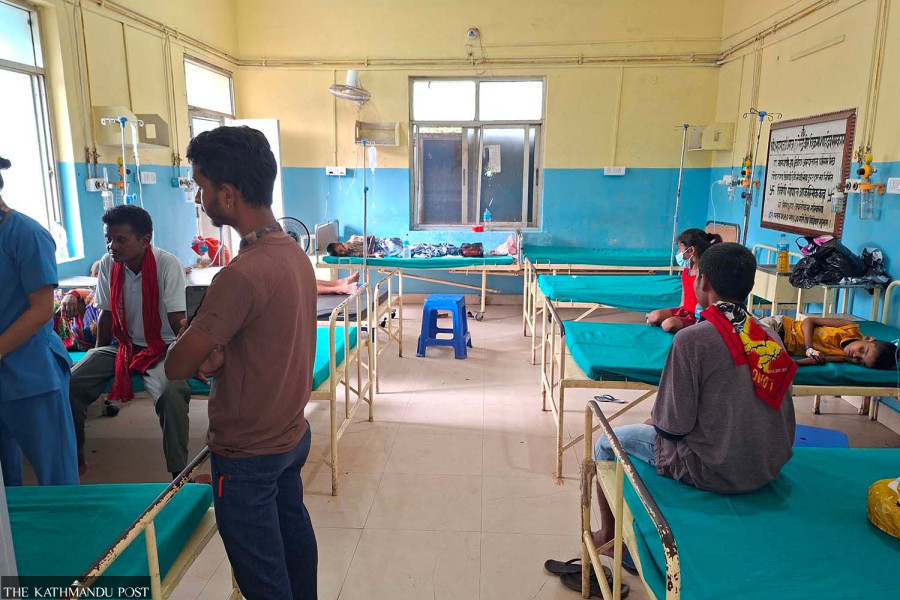Health
Birgunj cholera outbreak largest since Jajarkot in 2009
At least three people are dead, 93 have tested positive and over 300 sought treatment in various hospitals.
Arjun Poudel & Shankar Acharya
Seriously ailing diarrheal patients started seeking treatment at health facilities in Birgunj at the beginning of last week. Doctors attending to the patients reported the seriousness of the cases to their higher authorities and health agencies at the local, provincial, and federal levels. Rapid tests have shown cholera in most patients.
However, it took around a week for the authorities concerned to acknowledge the cholera outbreak and start taking measures to control the spread of the disease. Until then, two people had already died from the infection, and hundreds of people were infected with the potentially deadly disease, likely spread through contaminated drinking water.
“The outbreak of cholera in Birgunj and other parts of the country shows serious public health gaps,” said Dr Shyam Raj Upreti, former director general at the Department of Health Services. “We became too complacent after declaring the country open defecation free and started taking outbreaks as normal. This is not normal, as people have died and serious patients are in need of intensive care.”
Interestingly, six years ago, on September 30, 2019, the then government, which was also led by the current prime minister, KP Sharma Oli, had declared the entire country open-defecation-free amid much fanfare.
As of Monday evening, three people died, 93 tested positive for cholera and over 300 infected people sought care in various hospitals.
“All three deceased were brought dead to the hospital,” said Dr Bikash Devkota, secretary for the Ministry of Health and Population. “This shows that people are not seeking care until their condition becomes severe. Cholera cannot be treated at home. I request people in affected areas to seek hospital care immediately.”
According to local health officials, cases have been reported from wards 3, 11, 12, 13 and 16 of the Birgunj Metropolitan City.
Narayani Hospital and Terai Hospital each confirmed 32 cases, while 12 patients tested positive for cholera at National Medical College. Cases were also confirmed at Bhawani Hospital, Birgunj Health Care and Mangalam Pathology, Ali Ortho Hospital, among other local health facilities.
Cholera is a highly infectious disease that causes severe diarrhoea and vomiting, which can lead to dehydration and death within a few hours if left untreated.
Public health experts say the ongoing Birgunj outbreak is the largest since the Jajarkot incident in 2009. Sixteen years ago, the farwestern district of Jajarkot saw a major cholera outbreak that killed several and infected hundreds.
“This is a serious public health emergency,” said Dr Baburam Marasaini, a former director at the Epidemiology and Disease Control Division. “This incident exposes critical gaps in the government's preparedness and response system, and water and sanitation conditions.”
Experts are particularly alarmed that people are becoming severely ill and dying.
“We have admitted one patient in serious condition to the intensive care unit,” Dr Chuman Lal Das, director at the Narayani Hospital, told the Post over the Phone from Birgunj. “Several other seriously ill patients have been receiving intensive care at private health facilities.”
Officials say over two dozen critically ill patients are being treated in intensive care at various Birgunj hospitals.
Experts also criticise tendency to conceal outbreaks, and apathy towards improving water and sanitation, which contribute to repeated deadly outbreaks.
“Birgunj is a border area, and an outbreak of cholera there is a matter of serious concern,” said Marasini. “We have neglected water and sanitation issues and recurring diarrheal and cholera outbreaks. Outbreaks of diarrheal diseases, including cholera, are directly linked to drinking water, sanitation, and hygiene conditions.”
Health Ministry officials also blamed prolonged drought and water scarcity for the outbreak of cholera in Birgunj.
Public health experts say that authorities must not conceal or ignore these serious problems, as doing so costs lives. They say awareness is crucial for containing the outbreaks, and the general public must be informed about what is happening in their surroundings and precautions. Awareness drives and health education play a crucial role in changing behaviour, which requires years of investment and continuous efforts, they add.
Meanwhile, the National Public Health, where samples of stool from infected patients have been brought for testing, said that results of stool culture may come by Tuesday evening.
“Sometimes it takes 72 hours for results to come. We can expect them by Tuesday evening,” said Dr Ranjan Raj Bhatta, director at the laboratory.
“Sometimes rapid diagnostic tests can show false positives but not in such large numbers. Lab tests are also needed for serotyping of microbes.”
Nepal often witnesses outbreaks of water- and food-borne diseases, including cholera, during the monsoon season. Thousands of people get infected as floodwaters contaminate most of the drinking water sources.
Last year, at least 95 cholera cases were confirmed in Kathmandu, Lalitpur, Kailali, Pyuthan, Makawanpur, Rolpa, Sindhupalchok, Achham, and Rautahat districts.
The Vibrio cholera 01 Ogawa serotype was confirmed in the stool samples of infected patients.
Public health experts say that due to poor sanitation and hygiene, the country remains highly vulnerable to waterborne diseases, including diarrhoea, dysentery, typhoid, hepatitis, and cholera, especially in the monsoon season.
They say the risk of waterborne diseases will not decline until the country’s water and sanitation conditions improve, and people get safe drinking water. Several other factors, including storage conditions, supply pipes, and pollution of water sources, also impact the quality of water supplied to households.
The World Health Organisation says cholera is a global threat to public health, and a multifaceted approach is key to controlling the disease and reducing deaths.




 13.12°C Kathmandu
13.12°C Kathmandu
















